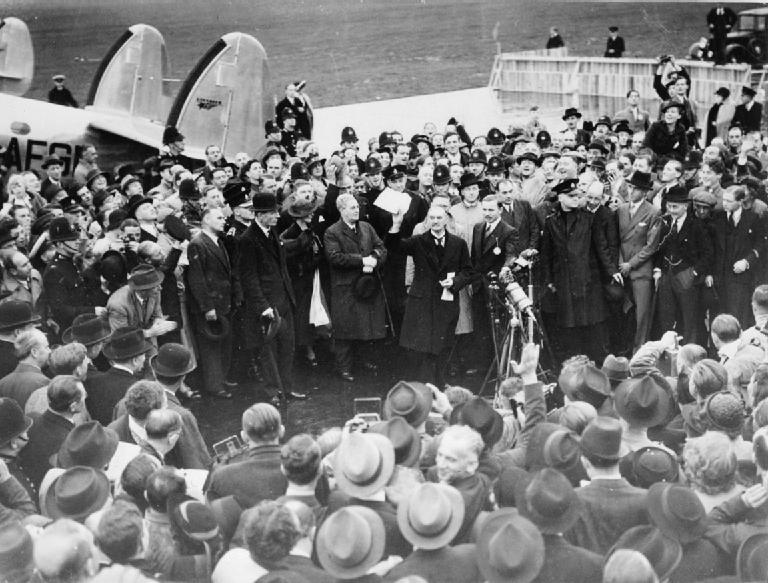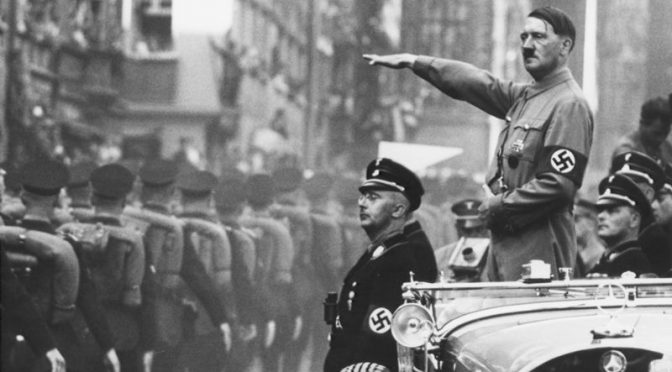THIS is exactly what the Reich wanted. Poland and Warsaw were joining Germany in hounding Czechoslovakia. France and England, which were trying to offer concessions and doing their best to meet Germany’s demands, wanted to save the existence of the Czech state, which was facing a united front of three states that were set to partition Czechoslovakia.
The leaders of the Reich, who made no secret of their goal to erase Czechoslovakia from the map of Europe, immediately used the Polish and Hungarian démarches to declare through their official print media as early as September 21, that a new situation had emerged which required a new solution.
Next. The fact that Poland expressed its appetite once it felt the hour for the division of the spoils was coming, could not have come as a surprise to those who were aware of the intentions of Polish Foreign Minister Józef Beck, who had displayed an increasing caution about Germany and was fully informed of the designs of Hitler’s leaders. In particular, due to regular contact with Hermann Goering throughout several months, the Polish foreign minister believed that the partitioning of Czechoslovakia was unavoidable, that it would happen before the end of 1938. Beck also made no secret of his intentions to claim Tìšín and to occupy it if needed.
And the last point. The differences between the party led by Konrad Henlein — the party’s leader in Czechoslovakia — and the Czechs only served as a pretext and the starting point for the Reich as, by persecuting the Prague authorities, the Reich could achieve its main objective, which was to take down a barrier to Germany’s expansion, as Czechoslovakia was an ally of France and Russia in Central Europe.
Only Churchill was honest
This is significant. How did the leading politicians around the world respond to the Munich Betrayal, an agreement signed between Hitler, Great Britain and France in 1938? What did well-known people who earned the respect of the public around the world and Europe say back then? We can say that with a few exceptions their reaction was positive and optimistic. Only Winston Churchill was honest in describing the situation, calling a spade a spade.
I want to add that after the agreement was signed, the British Prime Minister [Neville Chamberlain], speaking outside his residence on Downing Street upon his return from Munich on Sept. 30, 1938, said: “For the second time in our history, a British Prime Minister has returned from Germany bringing peace with honor. I believe it is peace for our time.” That is, for our generation.

After the Munich Agreement was signed, Franklin Roosevelt in his message of greetings to Chamberlain dated Oct. 5, 1938, wrote that he completely shared his belief that this was a great opportunity to establish a new order based on justice and the rule of law.
On Oct. 19, 1938, United States Ambassador to the United Kingdom, Joseph Kennedy, the father of future President John Kennedy, gave the following assessment of the Munich Agreement signed between the Western countries, or democracies, and Germany and Italy: “It has been my belief for a long time now that it is unproductive and unreasonable on the part of both democracies and dictatorships to emphasize the existing differences between them. They can benefit from working towards resolving their common problems, something that will change relations between them for the better.”
And now from Churchill’s speech made in the House of Commons in the British Parliament on Oct. 5, 1938: “We have sustained a total and unmitigated defeat… All is over. Silent, mournful, abandoned, broken, Czechoslovakia recedes into the darkness… Do not let us blind ourselves to that.” He said we should stop deceiving ourselves; we must look realistically at the scale of the disaster that the world is facing. “A disaster of the first magnitude has befallen Great Britain and France… We have sustained a defeat without a war, the consequences of which will travel far with us along our road… And do not suppose that this is the end. This is only the beginning of the reckoning. This is only the first sip.” Quite an assessment.
What was Churchill talking about? The fact that, in Munich, the so-called Western democracies had betrayed their ally, signaling that war was imminent.
Speaking at a League of Nations plenary meeting in September 1938, our foreign minister Maxim Litvinov said: “Avoiding a likely war today and getting a sure and universal war tomorrow — and that at the cost of feeding the aggressors’ insatiable appetite and destroying sovereign countries – does not mean acting in the spirit of the League of Nations pact.” That is, the Soviet Union condemned this event.
In this connection, I would like to present the following very important document; it is a curious document. Actually, we have all of them displayed at our exhibit. This is a response from the Political Bureau of the Russian Communist Party (Bolsheviks) to the Sept. 20, 1938 cable from the USSR’s plenipotentiary envoy to Czechoslovakia, Alexandrovsky. On Sept. 20, 1938, the political bureau of the Russian Communist Party (Bolsheviks) unanimously gave a positive answer to the direct question from President Edvard Benes as to whether the USSR would deliver prompt assistance to Czechoslovakia if France stood loyal to it.
Further, on Sept. 23, 1938, the Soviet Union officially notified Poland that if it invaded Czechoslovakia, the Soviet-Polish non-aggression pact would be terminated. Poland’s Foreign Minister Beck called this a propaganda ploy of no significance.
War could have been avoided
In addition, while considering the forthcoming invasion of Tesin, Poland did everything it could to prevent the Soviet Union from fulfilling its obligations to provide assistance to Czechoslovakia. As you recall, they were going to shoot down Soviet planes, and not allow the transit of Soviet troops to help rescue Czechoslovakia. Meanwhile, France, the chief ally of the Czechs and Slovaks at the time, in fact reneged on its guarantees to defend Czechoslovakia’s integrity.
Being left alone, the USSR had to face the reality created by the Western states. The partitioning of Czechoslovakia was cruel and cynical, in essence, it was pillaging. We have every reason to say that the Munich agreement was the turning point in history following which World War 2 became inevitable.
Hitler could have been stopped in 1938 through the collective efforts of the European states. This was acknowledged by the Western leaders themselves.
Another reference to a document. This is a transcript of conversations of May 17, 1939, between representatives of the French and Polish Commands about the possibilities of war in Europe between the Italian-German and Polish-French coalitions. The French chief of staff said at a meeting with the Polish minister of military affairs that the overall situation in 1938 offered many more opportunities for opposition to Germany. So what was he talking about? That given a timely response, the war could have been avoided. Meanwhile, during the Nuremberg Trials, Field Marshall Keitel said, when responding to the question of whether Germany would have attacked Czechoslovakia in 1938 if the Western powers had supported Prague, “No. We were not strong enough militarily.” The Munich [Agreement] objective was to push Russia out of Europe, gain time and complete the arming of Germany.
The Soviet Union consistently tried to prevent the tragedy of partitioning Czechoslovakia based on its international obligations, including its agreements with France and Czechoslovakia. However, Britain and France preferred to throw a democratic East European country to the Nazis to appease them. And not only that, but also to steer Nazi aspirations eastward. Poland at the time, unfortunately, was instrumental in this. The leaders of the Second Rzeczpospolita did everything they could to resist a collective security system that would include the USSR.
(Click page 4 button to continue…)


